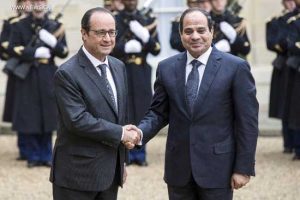
With an imminent satellite deal with Egypt, France is set to become the satellite manufacturer of choice for Middle East countries. John B. Sheldon, Chairman and President of ThorGroup GmbH, analyzes the geopolitical implications of this important deal.
French President Francois Hollande and Egyptian President Abdel Fattah al-Sissi are expected to sign a US$1.12 billion arms deal on 18 April 2016 when the French leader makes an official visit to Cairo. Among the items in the deal is a French-built military communications satellite to be built by French satellite manufacturing companies Airbus Defense and Space and Thales Alenia Space, as well as a number of naval vessels.
The deal will establish France as the dominant supplier of satellites to Middle Eastern countries, one of the most geopolitically dynamic regions in the world.
Interestingly, the satellite deal with Egypt could have been even bigger for Paris. French financial newspaper La Tribune reported on 17 December 2015, that Egypt was interested in purchasing not just a military communications satellite, but also a high-resolution imaging satellite from Airbus and Thales Alenia.
According to La Tribune, Egyptian president Abdel Fattah al-Sissi was keen to move quickly on the potential two-satellite deal, said to be worth about US$1.1 billion alone, and sent his chief acquisition official, Brigadier-General Mohamed Saeed El-Assar, to Paris on 17 December 2015 to begin negotiations with French defence officials and industry executives with the aim of reaching an agreement as quickly as possible. These talks were apparently postponed as French officials told their Egyptian counterparts that negotiations could not begin until technical issues, such as establishing orbital positions and slots for the satellites, had been resolved.
It has since transpired, however, that Cairo balked at the cost of a French-built reconnaissance satellite, and are believed to be now considering South Korean and Russian alternatives.
The full analysis is available as a paid download for 2.99 USD. If you are interested, please send us an e-mail stating the desired document to [email protected]
 SpaceWatch.Global An independent perspective on space
SpaceWatch.Global An independent perspective on space

